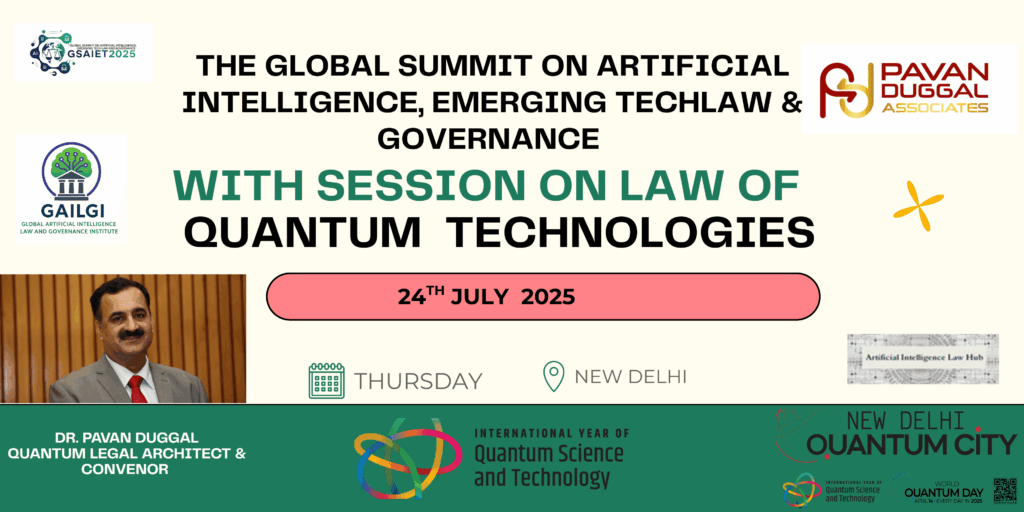The Global Summit on Artificial Intelligence, Emerging Tech Law & Governance 2025, with Session on Law for Quantum Technology
Summit Overview
Scheduled for 24 July 2025 in New Delhi, India, the Global Summit on Artificial Intelligence, Emerging Tech Law & Governance 2025 (GSAIET 2025) will convene the foremost jurists, policymakers, regulators, technologists, industry leaders, and civil-society advocates to confront the legal, ethical, and governance challenges posed by artificial intelligence and other disruptive technologies, including quantum technology.
Jointly organised by the Global AI Law & Governance Institute (GALGI), the Artificial Intelligence Law Hub, and Pavan Duggal Associates, Advocates, with academic collaboration from Cyberlaw University, the Summit is designed as a high-level working forum that transforms dialogue into tangible, actionable outputs:
• Adoption of an international consensus document articulating core legal and ethical principles for emerging technologies.
• Publication of a peer-reviewed, ISBN-registered proceedings volume capturing scholarly contributions and session insights.
• Launch of a sustained institutional partnership platform to drive cross-border cooperation, research, and capacity-building in AI law and policy.
Objectives
1. Forge a cohesive, human-centric, and ethically robust international AI-governance architecture.
2. Operationalise risk-based regulatory models inspired by instruments such as the EU AI Act.
3. Harmonise national AI laws with universal human-rights standards and multilateral frameworks (UN, UNESCO, OECD).
4. Establish clear liability principles for AI-related harms and mechanisms for mitigating algorithmic bias.
5. Address quantum-computing governance, cryptographic resilience, and national-security implications.
6. Define legal recognition and oversight for decentralised autonomous organisations (DAOs) and blockchain ecosystems.
7. Strengthen algorithmic transparency and explainability as constitutional or statutory imperatives.
8. Develop sector-specific ethical jurisprudence for autonomous systems in healthcare, transportation, and defence.
Profile of the Summit Chair
Dr Pavan Duggal – Chair & Convenor, GSAIET 2025
Dr Pavan Duggal is internationally recognised as a trail-blazer at the intersection of technology and jurisprudence. An Advocate of the Supreme Court of India, he has authored 200 books and advised governments, multilateral agencies and Fortune 500 companies on cyberlaw, AI regulation, data governance and emerging-tech policy.
Strategic Vision
• Architect of the Summit’s Intellectual Framework – personally conceived the six thematic pillars that align legal discourse with real-time technological advances.
• Champion of Interoperable Governance – advocates harmonised AI-law standards to ensure cross-border consistency while preserving national sovereignty.
• Driver of Outcome-Oriented Engagement – mandates that every panel produce concrete recommendations feeding directly into the Summit Outcome Document.
Leadership Milestones
• Founder & President – Global AI Law & Governance Institute (GALGI): galvanises global research networks to anticipate AI-related legal challenges.
• Chief Mentor – Blockchain Law Epicentre: pioneers jurisprudence for decentralised ecosystems, smart contracts and digital-asset compliance.
• Chairman – International Commission on Cyber Security Law: steers development of global cybersecurity legal standards.
• Chancellor – Cyberlaw University: has trained 29,000+ professionals from 170 countries in cyberlaw and AI-governance programmes.
Convening Power
Leveraging a career-spanning network, Dr. Duggal has secured the participation of cabinet-level regulators, UN advisors, leading AI scientists, and digital rights advocates from all inhabited continents. His outreach ensures that diversity of jurisdiction, discipline, and viewpoint is embedded in every Summit conversation.
Legacy Focus
Dr Duggal envisions GSAIET 2025 not as a one-off conference but as the launchpad for a sustained global movement that embeds legal foresight into the fabric of technological innovation, ensuring that progress remains anchored in human dignity, constitutional values, and sustainable development.
Thematic Pillars
Pillar Scope (Key Issues)
1. AI & Fundamental Rights Bias audits, algorithmic explainability, data-protection alignment, human-in-the-loop oversight
2. AI, Accountability & Liability Tort and regulatory models, systemic risk management, insurer frameworks
3. Cybersecurity & Autonomous Defence AI-enabled cyber-conflict, autonomous weapons, drone-warfare norms
4. Law for Quantum Technology & Decentralised Tech Smart-contract enforceability, zero-knowledge proofs, post-quantum crypto standards
5. Digital Trade, Competition & IP Cross-border data flows, antitrust in AI-driven markets, IP for AI-generated works
6. RegTech & LegalTech Innovation: AI-assisted compliance, smart-contract adjudication, digital dispute resolution
Distinguished Speakers
• Dr Rajiv Mani – Secretary, Legislative Department, Ministry of Law & Justice, Government of India
• Dr. Pavan Duggal- International acclaimed AI Law expert, President ,Global Artificial Intelligence Law and Governance Institute (GAILGI) and Summit Chair, GSAIET
• Traci Ruiz – High-Stakes Leadership Expert & Crisis Strategist
• Alfredo Ronchi – General Secretary, EC-MEDICI Framework; Chair, JRC S2D2
• Saakshar Duggal – Forbes Communication Council; 19× TEDx Speaker on AI Law
• Prof. Christoph Stückelberger – Founder, Globethics Foundation
Organising Entities
1. Global AI Law & Governance Institute (GALGI) – Centre of excellence for AI-law research and policy.
2. Artificial Intelligence Law Hub – Interdisciplinary platform tracking global AI-regulatory developments.
3. Pavan Duggal Associates, Advocates – Niche law firm specialising in cyberlaw, AI-governance and emerging-tech regulation.
VII. Anticipated Outcomes & Legacy
• Summit Outcome Document – to be tabled before the UN, G20 and OECD for standard-setting deliberations.
• ISBN-Registered Proceedings Volume – enduring resource for policymakers, academia and industry.
• Stakeholder Directory & MoUs – institutionalise research collaborations and capacity-building initiatives.
• Specialised Working Groups – permanent task-forces on AI-liability, quantum-tech law and digital-rights governance under GALGI’s auspices.
Registration
Secure participation via the official form
For speaking, sponsorship, or media enquiries, please contact: Dr Pavan Duggal, Summit Chair, GSAIET 2025
Email: pavan@pavanduggal.com | pavanduggal6@gmail.com
LinkedIn: linkedin.com/in/pavanduggal | Twitter: @pavanduggal
GSAIET 2025: Building the legal scaffolding for a technology-driven future—by humanity, for humanity.
Event Details



